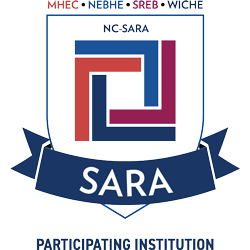Our Accreditors
New England Commission of Higher Education (NECHE)
Accreditation of an institution of higher education by the commission indicates that it meets or exceeds criteria for the assessment of institutional quality periodically applied through a peer review process. An accredited college or university is one which has available the necessary resources to achieve its stated purposes through appropriate educational programs, is substantially doing so, and gives reasonable evidence that it will continue to do so in the foreseeable future. Institutional integrity is also addressed through accreditation.
Accreditation by the commission is not partial but applies to the institution as a whole. As such, it is not a guarantee of every course or program offered, or the competence of individual graduates. Rather, it provides reasonable assurance about the quality of opportunities available to students who attend the institution. Inquiries regarding the accreditation status by the commission should be directed to the administrative staff of the institution. For comments and complaints, individuals may contact:
New England Commission of Higher Education
301 Edgewater Place, Suite 210
Wakefield, MA 01880
781-425 7785
Email: info@neche.org
https://www.neche.org/for-the-public/comments-complaints/
Office of Higher Education of the State of Connecticut
Quinnipiac also is accredited by the Office of Higher Education of the State of Connecticut and is authorized by the General Assembly of the state to confer such degrees and grant such diplomas as are authorized by the office. Contact information for filing a complaint with the Office of Higher Education:
Office of Higher Education
450 Columbus Boulevard, Suite 707
Hartford, CT 06103-1841
800-947-1800
https://portal.ct.gov/ohe/knowledge-base/articles/for-students/student-school-complaints?language=en_US
The State Bar Examining Committee has approved the undergraduate programs of Quinnipiac for pre-law education.
Specific school accreditations are listed below.
College of Arts & Sciences
The legal studies minor/certificate has been approved by the American Bar Association as a paralegal education program.
School of Business
Quinnipiac’s undergraduate and graduate business and accounting programs are accredited by AACSB International—the Association to Advance Collegiate Schools of Business. As a school of business with AACSB-accredited business and accounting programs, Quinnipiac meets or exceeds established standards, as determined by periodic AACSB peer group review. The AACSB quality standards relate to curriculum, faculty resources, admission, degree requirements, library and computer facilities, financial resources and intellectual climate.
School of Communications
The Bachelor of Arts and Master of Science in Public Relations programs are certified by the Certification in Education for Public Relations (CEPR) through the Public Relations Society of America (PRSA).
School of Computing & Engineering
The Civil Engineering program is accredited by the Engineering Accreditation Commission of ABET, https://www.abet.org, under the commission’s General Criteria and Program Criteria for Civil and Similarly Named Engineering Programs.
The Industrial Engineering program is accredited by the Engineering Accreditation Commission of ABET, https://www.abet.org, under the commission’s General Criteria and Program Criteria for Industrial and Similarly Named Engineering Programs.
The Mechanical Engineering program is accredited by the Engineering Accreditation Commission of ABET, https://www.abet.org, under the commission’s General Criteria and Program Criteria for Mechanical and Similarly Named Engineering Programs.
The Software Engineering program is accredited by the Engineering Accreditation Commission of ABET, https://www.abet.org, under the commission’s General Criteria and Program Criteria for Software and Similarly Named Engineering Programs.
The BS in Computer Science program is accredited by the Computing Accreditation Commission of ABET, https://www.abet.org, under the commission’s General Criteria and Program Criteria for Computer Science and Similarly Named Computing Programs.
School of Education
The master of arts in teaching program and the educational leadership program are fully accredited by the Council for the Accreditation of Educator Preparation (CAEP) and the Connecticut Department of Education. The U.S. Department of Education recognizes CAEP as a specialized accrediting body for schools, colleges and departments of education.
The following programs in the School of Education are accredited by the Council for the Accreditation of Educator Preparation (CAEP) and by the Connecticut State Department of Education (CSDE) from 2021-2028:
Elementary Education
Biology Education
English Education
Mathematics Education
Social Studies/History Education
Spanish Education
6th Year Educational Leadership
The following are new programs which were approved by the CSDE and will be submitted for accreditation in the next cycle as per the requirements of CAEP:
Chemistry Education (approved in 2024)
Special Education - Initial Certification (approved in 2022)
School of Health Sciences
All programs in the School of Health Sciences have been approved by appropriate state and national agencies or are in the process of accreditation.
- The cardiovascular perfusion program is accredited by the Commission on Accreditation of Allied Health Education Programs.
- The social work program is fully accredited by the Council on Social Work Education (CSWE).
- The dual-degree bachelor of science/master of occupational therapy (BS/MOT) program and the entry-level doctor of occupational therapy (EOTD) programs are accredited by the Accreditation Council for Occupational Therapy Education (ACOTE).
- The pathologists’ assistant program is accredited by the National Accrediting Agency for Clinical Laboratory Sciences (NAACLS).
- The physical therapy program is accredited by the Commission on Accreditation in Physical Therapy Education (CAPTE).
- The radiologic sciences bachelor’s degree program is accredited by the Joint Review Committee on Education in Radiologic Technology.
- The radiologist assistant program is formally recognized by the American Registry of Radiologic Technologists (ARRT).
- Physician assistant graduate program accreditation: The Accreditation Review Commission on Education for the Physician Assistant, Inc. (ARC-PA) has granted Accreditation-Continued status to the Quinnipiac University Physician Assistant Program sponsored by Quinnipiac University. Accreditation-Continued is an accreditation status granted when a currently accredited program is in compliance with the ARC-PA Standards.
Accreditation remains in effect until the program closes or withdraws from the accreditation process or until accreditation is withdrawn for failure to comply with the Standards. The approximate date for the next validation review of the program by the ARC-PA will be July 2033. The review date is contingent upon continued compliance with the Accreditation Standards and ARC-PA policy.
The program’s accreditation history can be viewed on the ARC-PA website at https://www.arc-pa.org/accreditation-history-quinnipiac-university/.
School of Law
Quinnipiac University School of Law is fully approved by the Council of the Section of Legal Education and Admissions to the Bar of the American Bar Association.
School of Medicine
The Frank H. Netter MD School of Medicine is accredited by the Liaison Committee on Medical Education. The school is also authorized by the state of Connecticut to award the MD degree. The Frank H. Netter MD School of Medicine is a member of the American Association of Medical Colleges.
School of Nursing
- The bachelor's degree program in nursing at Quinnipiac University is accredited by the Commission on Collegiate Nursing Education (https://www.aacnnursing.org/ccne-accreditation).
- The master’s degree program in nursing at Quinnipiac University is accredited by the Commission on Collegiate Nursing Education (https://www.aacnnursing.org/ccne-accreditation).
- The doctor of nursing practice program at Quinnipiac University is accredited by the Commission on Collegiate Nursing Education (https://www.aacnnursing.org/ccne-accreditation).
- The undergraduate nursing programs in Quinnipiac University's School of Nursing are endorsed by the American Holistic Nurses Credentialing Corporation (ahncc.org).
- The Medicine, Nursing and Health Sciences Simulation Program (Area of Teaching/Education) is accredited by the Society for Simulation in Healthcare.
National Council for State Authorization Reciprocity Agreements (SARA)
Quinnipiac University has been approved to participate in the National Council for State Authorization Reciprocity Agreements (SARA). SARA is an agreement among its member states, districts and U.S. territories that establishes comparable national standards for interstate offering of postsecondary distance-education courses and programs. The Connecticut Office of Higher Education is the portal agency for administration of SARA in Connecticut and is responsible for the resolution of out-of-state students’ complaints against SARA institutions located in Connecticut.
Information about how to file a complaint with the Office of Higher Education is available on the CT Office of Higher Education website.
All correspondence, including institutional applications and student complaints, should be sent via email to Emily.Bjornberg@ct.gov or via post to the following address:
Emily Bjornberg
SARA Coordinator
Office of Higher Education
450 Columbus Boulevard, Suite 707
Hartford, CT 06103-1841


